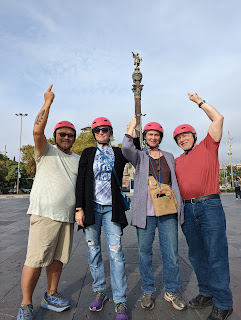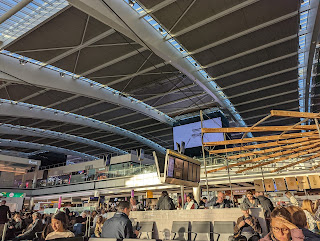Tucker Mythology
Worst Best Man
Part Seven, Recovered
Andrea dug into her purse. She pulled out a handful of pens and papers. I sat down in an empty seat by her reception table. She took a chair next to me. For a moment, she stared and waited. I sank my head into my hands.
"I'll cut the paper into note cards," she said. She folded the largest piece into quarters, then eighths.
After a pause, pen to lip, I started jotting down notes. There were a lot of stories I could tell about Tucker. I wanted to find one that was emblematic of him. Ideally, it would be one that any listener could use to project forward into the kind of married man he would become.
What I ended up with after the first attempt was a list of phrases, reminders about growing up with Tucker. There was a time we'd bicycled fourteen miles to visit a girl. Her father had given us each a beer as a reward. Another time, we drove twenty miles to buy bottle rockets in a brown paper bag so we could hide them from our parents and the law.
We had also shot bows in the forest and scooped up crawfish from the creek. We'd hunted the roadside trees for black walnuts, busted them open with a hammer, and tried to bake them. We'd built dams and deadfall traps, learned to drive, and taken girls on double dates. I sifted through our lives together for the best stories, the ones that revealed the most about Tucker's character. It wasn't hard to think of incidents. It was more difficult to choose among them for the metaphors about the rest of his time here on earth.
Andrea read over my shoulder. Otherwise, she tried to remain quiet. Around us, later carloads of people started to file in for the banquet. The smells of the food cooking grew stronger. No one approached us, though. It occurred to me that I was grateful for something to do. Sure, it was rough to get a speech as a last-minute assignment. But there was some daredevil fun to it, too. I started mentioning some of my ideas about things Tucker and I had done to make Andrea snort into her water glass. She had big, expressive eyes. They widened a few times when hearing about our teenaged adventures.
"Hey, man." Tucker returned to look over my other shoulder. "Laura's concerned about the speech. She doesn't want you to mention any time we broke the law together."
"Okay." That eliminated a bunch of ideas but it seemed like a reasonable request. I had plenty of other sorts of stories to try. The requirement narrowed my choices down. Maybe it would help.
He smiled and waved to other guests. A young man and a woman I didn't know, apparently a couple, stopped by at the table. They got into a drink-sloshing conversation. Another couple joined in. After a while, I think Tucker understood that his presence was getting in the way of the writing. He led his group of guests away to the side of the room where his wife was holding court with her friends.
Five minutes later, he returned.
"A few more requests from Laura," he began. This time, he had a long list of things that his wife didn't want me to mention. I got the impression that Tucker was adding to the list as he went through it, too, as it occurred to him that he'd done a few deeds he still didn't want me to mention in front of his parents. He kept glancing to the Mostrom family table.
When he left, I had a column of marks next to my column of ideas. The three notecards I'd assembled were no good, for sure.
"If you follow those requests, you have to eliminate everything," Andrea observed.
"Well, there's ... no, not that." I pointed to a cute story note. But no, I'd been told I couldn't talk about an incident involving other women. That rule made sense.
"You've got nothing." Andrea had stopped smiling. Now she was irritated. "You should just throw him under the bus. Talk about how he never met with you this whole summer. He never told you what to do as best man."
"I think they all expected me to just know," I said, meaning his friends and family. It felt like I should have just known. But Andrea was right. No one is born knowing what to do in a wedding service or that the wedding ceremony, in an unspoken way, continues to its second half in the reception dinner.
"At least my time allowed has been cut to two minutes." That had seemed like a heavy restriction when I'd heard it. Now it was a bright spot in the plans.
"Sure." Andrea rolled her eyes and gave me an indulgent smile. "Can you talk for two minutes about nothing?"
"Probably." Maybe it should have been an intimidating prospect but I found myself weirdly confident. I was already getting an idea about what to do.
I'd written notes about the end of the speech. Whatever I talked about for the story, I wanted it to lead me into the real subject of the day, which was love. Why not forego the story entirely? They'd been rubbed out by all the requirements. And it wouldn't matter to the real point. I could talk about the challenges of being a couple. I knew those pretty well, I thought. I could continue about the ideals of love, of growing together, of not just sustaining affections but improving them with life and time and children, of becoming more and more in love over the years.
"I can do it." All it took were a few more notes. When I was done, I looked at the mess, and decided to write a fresh copy to get the wording right.
An hour later, after a light and queasy dinner of chicken with vegetables, everyone tapped their glasses and startled me.
"That's the call for your speech," Tucker leaned and whispered to me.
I stood up and immediately talked about growing older and growing more in love.
"Oh!" Tucker's mother said when I finished. She seemed shocked that I was so brief. I think I came in at less than my two minutes. Then I raised my glass, half-filled with wine. Everyone raised theirs in response. And we all drank.
#
There is a picture of me from that day, taken by my girlfriend. It was a good camera shot under the circumstances. (She was an excellent artist plus she looked at me with a flattering eye.) My expression is tired but resolute. Ready. Determined to do the right thing.
The last thing I did for the married couple was to truss up their car. The end of that job was the last I saw of Tucker. He was standing in a big crowd, surrounded by his new friends and his family. I waved. He didn't see me.
As I drove home I felt so tired I had to pull off the road and close my eyes. I knew I'd screwed up. Tucker never called, not for the remainder of the summer and not at Christmas. He never replied to my letters. The following spring, I mailed him the first story I sold for money and I had to wonder if he ever saw it.
A lot has gone on in everyone's life since. The woman I'd been living with split, although we stayed in contact for a few years. She made new friends and a new life. I did, too. Tucker lived through an active time that included a divorce and a re-marriage before I met him again. Despite all the friendships for everyone involved, though, I've probably never again had as close a buddy as Tucker. I'm sure I never will. It was a special thing, a teenage blood-brother bond. You can only develop them when you're young, romantic, and willing to bare and share your secret heart. You have to have a secret heart in the first place. Even now, a few of my closest friends knew me as a teen and I treasure them. They know parts of me, and I of them, that no one else will ever see.
What Tucker and I had when we were fifteen, cutting down trees and hiking through the woods, was a perfect start for a lifetime of friendship. It didn't quite finish that way but that's on us. Although I didn’t know it at the time, the end of our closeness around the time of his wedding was inevitable, maybe just the right thing. It had to happen somehow. We had to leave each other behind.
We're lucky. As adults, we met again and instantly found a verbal chemistry, a friendship that was different, new, and reasonably adult - as adult as they two of us were going to be.
#
"What's that?" Andrea asked in the evening.
I looked at the piece of paper in my hand. I'd taken it from my pants pocket as I changed back into my clothes from the day before. This thin scrap had a girl's name at the top and a phone number beneath.
"Oh, yeah." It took me a second to remember. "All those times I got girls to dance with Tucker? One of them gave me her phone number. I can't remember why."
Then, suddenly, I had a vision of her. She was a short, dark-haired cutie. Her face was flushed as we paused between dances.
"I never do this," she'd told me. She pressed a piece of paper into my hand. "But your bachelor party is leaving soon, you said, and you're so drunk. You're not going to remember this. I can't just tell you my number."
Andrea's expression clouded as she watched me recall the pretty face. She looked at the wastebasket, turned her back, and marched away. With a sigh, I dropped the scrap into it.
Well, that's the last time that will ever happen, I told myself. I sighed for youth lost, opportunities frittered and gone. Then I sat down with last night's shirt in my lap. When I put my elbow on the shirt, it crinkled.
I stopped, turned over the shirt, and patted it down. There was another slip of paper. I pulled it out of the front pocket.
Another phone number on it, this time with no name. It looked like my writing this time.
I tossed it on my desk. A few minutes later, I brushed the second scrap into the trash can along with the first.








